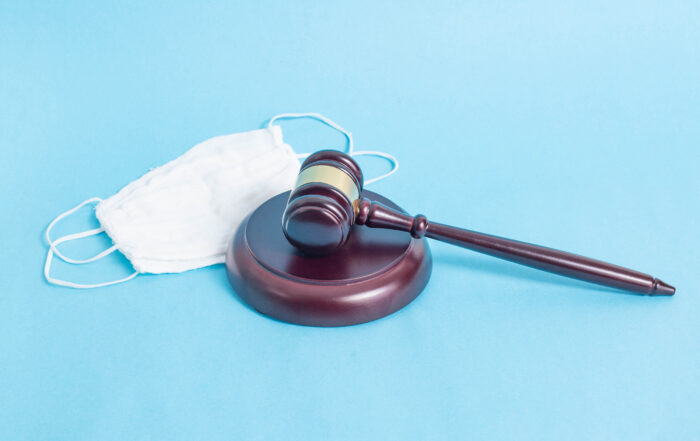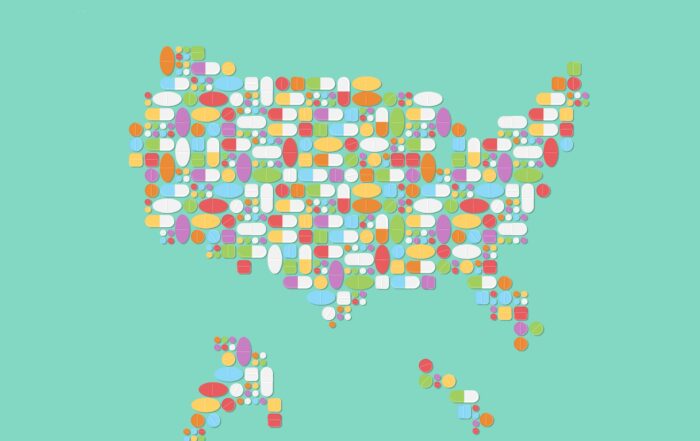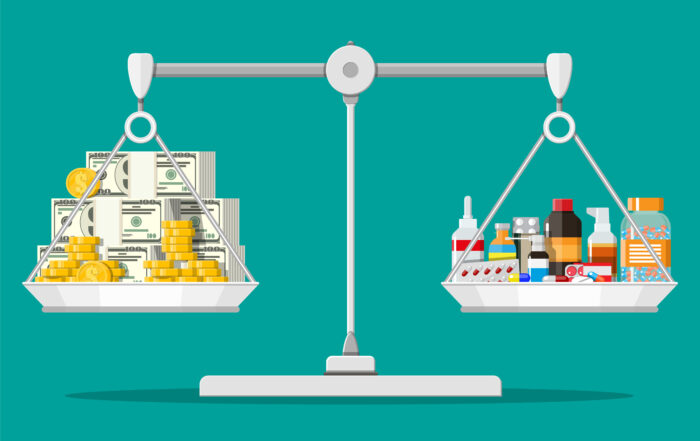
Reverse Distribution: Serving Public Health Under Range of State Rules
By Jonathan Keller, Libby Baney & Jay Warmuth
As readers here know, traditional pharmacy practice and regulation focus primarily on the distribution and dispensation of pharmaceuticals. Most federal and state laws and regulations relate to the lawful distribution of pharmaceuticals and integrity of the supply chain. Reverse distribution is an important and often overlooked component of the drug supply chain system. Practitioners that work in this space, whether it be regulatory attorneys or employees responsible for licensing and compliance at a reverse distributor, and even those entities serviced by reverse distributors, need to be aware of the patchwork of regulations governing reverse distribution activities.
Reverse distributors (also known as return processors or reverse logistics providers) are often involved in the disposition or processing of saleable or non-saleable products received from an authorized trading partner. These products are then processed for credit or are otherwise disposed of and removed from distribution channels. This is a highly complex process that often involves numerous touchpoints throughout the drug supply chain and is governed by multiple levels of regulatory oversight, including federal, state, and local agencies. Reverse distributors, as well as the vendors serviced by reverse distributors, need to be keenly aware of the varying licensing requirements governing these activities. Failure to do so may result in disciplinary action by a board of pharmacy, which, among other things, could result not only in a monetary penalty but also trigger reciprocal discipline by other state boards and regulatory agencies.
While some states specifically define reverse distributors and what constitutes reverse distribution, many other states either include reverse distributors under the umbrella of wholesale distributors or simply do not address them. Where there are regulations, they are often vague or inconclusive and require outreach to regulators at the applicable governing body for clarification. Periodically, these regulators interpret and apply their state regulations differently, leading to inconsistent guidance for reverse distributors.
A Real-World Example of Reverse Distribution: A licensed reverse distributor arrives at a retail pharmacy and brings the truck around the back of the building where two pallets of expired, adulterated, or discarded controlled substances are waiting for pickup. The technician meets with pharmacy staff, goes over the inventory, and signs for the drug product, but he does not leave just yet. Some reverse distributors will render the controlled substance products irretrievable through a series of processes that ensure these controlled substances cannot be subsequently used or abused. This may seem to be a relatively simple step, but it is extremely important in the ongoing efforts to protect public health. The technician will then package the controlled substance products and bring them to a common carrier for delivery to an out-of-state destruction facility that will ultimately incinerate the pharmaceutical product. These steps are an important part of our drug supply chain, but the nuances of the process are often not fully considered by regulators. As a result, there are significant state-by-state differences in the licensing and oversight of reverse distributors and the reverse distribution services that they provide.
Level-Setting: What is a Reverse Distributor Anyway?
State: While each state has its own definition, to the extent it has one, a reverse distributor can generally be described as an entity that receives or handles pharmaceutical products, which may include controlled substances, from another trading partner (such as a wholesaler, retail pharmacy, healthcare facility or manufacturer) for the purpose of arranging for the credit for or disposal of unwanted, unusable, or outdated pharmaceuticals and hazardous waste.[1]
Federal: The U.S. Drug Enforcement Administration (DEA) requires any reverse distributor that engages in “reverse distribution” to hold a DEA registration. The DEA defines reverse distribution to mean the acquisition of “controlled substances from another registrant or law enforcement for the purpose of: (1) return to the registered manufacturer or another registrant authorized by the manufacturer to accept returns on the manufacturer’s behalf; or (2) destruction.”[2]
How It Works: Oftentimes, a reverse distributor receives unwanted, unusable, or outdated pharmaceuticals from a pharmacy or other facility that ships the product(s) directly to the reverse distributor. In other cases, the reverse distributor will pick up and transport, or arrange for the pickup and transport of, the unwanted pharmaceutical products from the customer. In these situations, the reverse distributor will either physically transport the pharmaceutical products itself or ship the products to its destruction facility via the U.S. Postal Service or common carrier. During this process, the reverse distributor typically takes title and possession of the pharmaceutical products when the products are picked up from the customer. Even if the reverse distributor uses the U.S. Postal Service or common carrier to ship the product to its destruction facility, the reverse distributor will generally maintain title to such products even though possession has been transferred to the shipping agent. This is an important fact because state licensure requirements often, but not always, depend on where in the distribution chain a reverse distributor takes title and possession of the pharmaceutical product.
Generally speaking, if an out-of-state reverse distributor picks up pharmaceutical product from a customer (and thus takes title and possession of the pharmaceutical product) to transport the product to its destruction facility, most states have determined that a non-resident license in that non-resident state is required. However, if the customer (e.g., a retail pharmacy), rather than the reverse distributor, ships or transports the pharmaceutical product to the reverse distributor’s destruction facility, and the reverse distributor does not actually take possession of the product, then the reverse distributor will generally not be required to hold a non-resident license in the customer’s state.
Why It Matters: The Last Mile in Protecting Public Health and Safety
The handling and removal of pharmaceutical products is an often-forgotten aspect of pharmacy practice and regulation. It is, however, a substantial public health matter. In addition to removing unwanted, unused, or unsaleable pharmaceuticals, reverse distributors also remove pharmaceutical waste from retail and hospital pharmacies and drug manufacturers. Pharmaceutical waste is often generated through a wide variety of activities in a healthcare facility, including, but not limited to, intravenous (IV) preparation; general compounding activities; spills or breakage; partially used vials, syringes, and IVs; discontinued or unused preparations; unused unit dose repacks; patients’ personal medications; and outdated pharmaceuticals.
Pharmaceutical waste must also be disposed of in accordance with stringent requirements and specified timeframes in compliance with state and federal pharmacy and hazardous waste laws. In doing so, reverse distributors follow precise procedures to reduce the public’s risk to exposure, contamination, and diversion of these products. Not all reverse distributors are capable of providing reverse distribution or waste disposal services throughout the United States. This may be due to the reverse distributor not holding the requisite state license(s) or the reverse distributor’s destruction facility lacking the capacity to handle such quantities of waste.
If reverse distribution services are interrupted due to regulatory or operations issues associated with licensing or registration, this can lead to major disruption for retail and hospital pharmacy customers who must remove the pharmaceutical product from their premises. Given public health concerns and the diversion risks when handling pharmaceutical waste involving controlled substances, it is important that pharmacies have specialized, credible reverse distribution vendors set up to appropriately remove and dispose of the waste in a timely and compliant manner.
Variation, Inconsistency, and Some Confusion: How Are Reverse Distributors Regulated?
For the vast majority of states, reverse distributors are regulated by the state Board of Pharmacy. In a handful of states, however, regulatory agencies other than the state Board of Pharmacy exercise regulatory authority over reverse distributors. For example, reverse distributors are overseen by the Department of Health in the District of Columbia and Washington state, the Department of Consumer Protection in Connecticut, the Department of State in Delaware, the Board of Drug and Device Distributors in Louisiana, the Department of Agriculture and Consumer Services in North Carolina, and the Department of State Health Services in Texas. When considering whether a reverse distributor should hold a license in a particular state, it is important to know the governing state agency and thus the applicable statute and regulations.
The Varied Landscape of Reverse Distributors Licensing Requirements
A significant concern of regulators and reverse distributors is the ambiguity surrounding whether a reverse distributor is required to be licensed in a particular state. Not all states license reverse distributors. For example, the state of Alaska Board of Pharmacy does not require a reverse distributor to hold a license in Alaska so long as the reverse distributor does not resell the collected product.[3] This appears to apply to both resident and non-resident reverse distributors.
Some states have taken a narrower approach and do not require reverse distributors to hold a non-resident license in certain circumstances. For instance, the Idaho and Hawaii Boards of Pharmacy have indicated that they do not require non-resident reverse distributors to hold a license in order to conduct business in their respective states. Other states have taken a somewhat different approach to non-resident licensure and have tied such licensure requirements to other criteria. A reverse distributor not physically located in Pennsylvania, but performing reverse distribution services in Pennsylvania, is only required to hold a non-resident license if it either (1) has sales representatives physically working or operating in Pennsylvania, or (2) if the reverse distributor is shipping or receiving product containing a list I chemical from a facility located in Pennsylvania.[4] Overall, whether a reverse distributor is required to hold a license in a specific state is a fact-specific analysis and often depends on the specific business activity the reverse distributor is performing in that state.
When determining whether a reverse distributor is required to hold a license in a specific state, you may need to look beyond the applicable statute and regulations, especially if they are silent regarding reverse distributors. For instance, the applicable state’s Board of Pharmacy may have published an FAQ or some other guidance document regarding licensure of reverse distributors. Additionally, a review of the meeting minutes of a state’s Board of Pharmacy may provide useful insight as to how the Board views reverse distributors. A state’s wholesale distributor license application may also provide additional insight as to whether the state issues licenses to resident or non-resident reverse distributors, especially if the license application contains a section specifically for reverse distributors.
Don’t Forget About Drug Distributor Accreditation Issues
Once it is determined that a reverse distributor should hold a license in a particular state, there are oftentimes additional considerations—one of which is Drug Distributor Accreditation (DDA) from the National Association of Boards of Pharmacy (NABP). DDA, formerly known as Verified-Accredited Wholesale Distributors (VAWD), is an accreditation program for wholesalers that indicates whether a particular wholesaler meets certain minimum compliance standards established by NABP. The process of obtaining DDA is time-intensive and can often take months, especially if a reverse distributor is not properly prepared for the accreditation process. This is an important consideration because DDA is a requirement for licensure in Indiana, Iowa, North Dakota, and Wyoming, and failure to obtain DDA in a timely manner will delay reverse distributor licensure in these states.
Adding Complexity: Reverse Distribution of Controlled Substances
If a reverse distributor will be engaging in the reverse distribution of controlled substances, there are additional considerations to keep in mind. In addition to holding the requisite controlled substance registration certificate from DEA, the applicable state-controlled substance laws must also be reviewed. Some states will issue a separate state-level controlled substance registration (CSR). Other states will simply indicate on the reverse distributor’s underlying state license whether such entity is permitted to handle controlled substances.
Another consideration regarding controlled substances is understanding which state agency is responsible for issuing the CSR. For example, the Boards of Pharmacy of Iowa and Michigan are responsible for issuing both a distributor license and a separate CSR to reverse distributors handling controlled substances in their applicable jurisdiction. However, there are several states that have separate agencies governing CSR licensure requirements, and it would be necessary to review such requirements should a reverse distributor seek to handle controlled substances in those states. For instance, the South Dakota Board of Pharmacy is the agency responsible for issuing a distributor permit to a reverse distributor, but it is the South Dakota Department of Health that is responsible for issuing a CSR to a reverse distributor. Failure to review the licensure requirements of both agencies may cause a reverse distributor to lack a CSR when, in fact, such a license is required in a particular state.
This is even more important for those states that may not require a reverse distributor to hold a distributor license to perform general reverse distribution activities but do require the reverse distributor to hold a CSR in order to handle controlled substances. In these situations, the reverse distributor is typically required to first obtain its state distributor license before it can apply for and obtain its CSR. For example, the state of Hawaii Board of Pharmacy does not license non-resident reverse distributors;[5] however, the state of Hawaii Department of Public Safety, Narcotics Enforcement Division has indicated that a non-resident reverse distributor collecting controlled substances within Hawaii is required to hold a CSR even though the Hawaii Board of Pharmacy has indicated that its laws and regulations do not address reverse distributors.[6] Similarly, a non-resident reverse distributor would not be required to hold a license from New York’s Board of Pharmacy if it only sends product out of New York.[7] But, New York’s Bureau of Narcotic Enforcement requires a reverse distributor to hold a CSR to distribute or handle controlled substances within New York.[8] In both of these examples, the reverse distributor would not need to hold a distributor license from the state Board of Pharmacy if not for the fact that the reverse distributor distributes and handles controlled substances in those states.
The variation in state approaches to these issues underscores the fact that when controlled substances are involved, it is imperative to review a state’s licensure requirements regarding the distribution of controlled substances, especially when such activity is governed by a separate state agency.
Final Thoughts: Not All Reverse Distribution Operations Are the Same
As this article shows, the regulation of reverse distribution is complex and varied across the states. In assessing whether a reverse distributor is required to hold a license in a particular state, it is imperative to understand the specific business activities that are being performed by the reverse distributor in that state and that pharmaceutical products are being handled. Even then, many state statutes and regulations are vague or inconclusive, and reverse distributors may need to rely on other forms of agency guidance or experienced legal counsel.
[1] By way of example: (1) Idaho defines a “reverse distributor” to mean a drug outlet that receives nonsalable prescription drugs from persons or their agents, who may lawfully possess prescription drugs without being issued a valid prescription drug order, and that processes for credit or disposes of such prescription drugs. I.C. § 54-1705(43); (2) Kentucky defines a “reverse distributor” to mean every person who acts as an agent for pharmacies, drug wholesalers, manufacturers, or other entities by receiving, taking inventory, and managing the disposition of outdated or nonsalable drugs. KRS § 315.400(17); (3) Nebraska defines a “reverse distributor” to mean a person whose primary function is to act as an agent for a pharmacy, wholesaler, manufacturer, or other entity by receiving, inventorying, and managing the disposition of outdated, expired, or otherwise non-saleable medications. Neb. Admin. R. & Regs. Tit. 172, Ch. 131, § 002; (4) New Hampshire defines a “reverse distributor” to mean a person or persons who facilitate the removal, disposal, or destruction of prescription drugs to persons other than consumers. N.H. Rev. Stat. § 318:1(XXIX); and (5) Washington defines a “reverse distributor” to mean a pharmaceutical wholesaler that receives drugs for destruction, return credit, or otherwise disposes of drugs received from a registrant that holds a credential to dispense or possess drugs. WAC 246-945-001(72).
[2] 21 C.F.R. § 1300.01.
[3] State of Alaska Board of Pharmacy Frequently Asked Questions (FAQ). https://www.commerce.alaska.gov/web/cbpl/ProfessionalLicensing/BoardofPharmacy/FrequentlyAskedQuestions.aspx.
[4] Pennsylvania Department of Health – FAQs (Frequently Asked Questions), version 4.0.0. https://apps.health.pa.gov/ddc/DDCFaqs.asp#0000000081.
[5] State of Hawaii Board of Pharmacy Meeting Minutes, Sept. 15, 2011. https://files.hawaii.gov/dcca/pvl/boards/pharmacy/board-meeting-minutes/Pharmacy_110915.pdf.
[6] HRS § 329-32(a).
[7] N.Y. Educ. Law sec. 6808-b(2).
[8] 10 NYCRR 80.10(a).

 JONATHAN A. KELLER is a senior associate at Faegre Drinker. He is a registered pharmacist and attorney who leverages his pharmacy background to advise health care and life science companies on a wide range of regulatory, compliance and licensure matters. As the co-leader of the firm’s PBM and Pharmacy Services segment, he advises on strategic transactions and licensing matters, drug compounding, controlled substance regulations, telemedicine/telepharmacy issues, pharmacy accreditation, and various other pharmacy regulatory matters. Jonathan was previously in-house counsel at a community hospital in New Jersey.
JONATHAN A. KELLER is a senior associate at Faegre Drinker. He is a registered pharmacist and attorney who leverages his pharmacy background to advise health care and life science companies on a wide range of regulatory, compliance and licensure matters. As the co-leader of the firm’s PBM and Pharmacy Services segment, he advises on strategic transactions and licensing matters, drug compounding, controlled substance regulations, telemedicine/telepharmacy issues, pharmacy accreditation, and various other pharmacy regulatory matters. Jonathan was previously in-house counsel at a community hospital in New Jersey. LIBBY BANEY is a partner at Faegre Drinker where she serves as the Co-Chair of the Digital Health Group. Libby envisions and executes on legal and policy solutions for health & life sciences companies and nonprofits. She’s known for her “yes, let’s find a way!” approach to problem solving and client service. She applies this can-do attitude when advising and advocating on issues related to FDA and state pharmacy regulatory matters. Recently Libby has worked on issues of internet pharmacy and the Ryan Haight Act, prescription, drug distribution and the Drug Supply Chain Security Act, and telehealth.
LIBBY BANEY is a partner at Faegre Drinker where she serves as the Co-Chair of the Digital Health Group. Libby envisions and executes on legal and policy solutions for health & life sciences companies and nonprofits. She’s known for her “yes, let’s find a way!” approach to problem solving and client service. She applies this can-do attitude when advising and advocating on issues related to FDA and state pharmacy regulatory matters. Recently Libby has worked on issues of internet pharmacy and the Ryan Haight Act, prescription, drug distribution and the Drug Supply Chain Security Act, and telehealth. JAY A. WARMUTH is a partner at Faegre Drinker where he helps clients solve for complex legal, regulatory, and policy issues in the managed care and prescription drug supply chain industries. He chairs the Insurance group’s Managed Care & Health Insurance Team and is a co-leader of the firm’s PBM and Pharmacy Services segment. His experience includes advising clients on regulatory and transactional matters in the pharmacy benefit management, pharmacy services and drug supply chain industries, state and federal health insurance regulatory and policy matters, and health insurance and managed care industry mergers and acquisitions.
JAY A. WARMUTH is a partner at Faegre Drinker where he helps clients solve for complex legal, regulatory, and policy issues in the managed care and prescription drug supply chain industries. He chairs the Insurance group’s Managed Care & Health Insurance Team and is a co-leader of the firm’s PBM and Pharmacy Services segment. His experience includes advising clients on regulatory and transactional matters in the pharmacy benefit management, pharmacy services and drug supply chain industries, state and federal health insurance regulatory and policy matters, and health insurance and managed care industry mergers and acquisitions.



